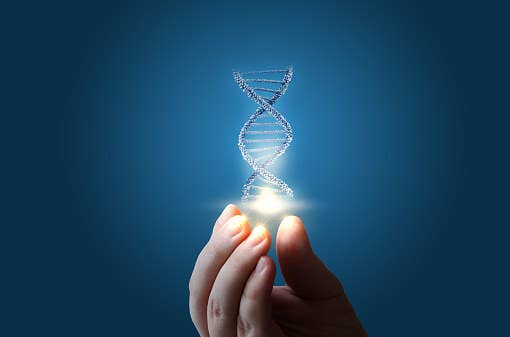We sat down with Sharon Briggs, PhD — a senior scientist at Helix, a personal genomics company — to pick her brain on nutrigenomics and what it tells us about our bodies.

1. What exactly is nutrigenomics in the plainest terms possible?
Dr. Briggs: Nutrigenetics — or nutrigenomics — is really just the study of how someone's DNA influences how they are metabolizing nutrients. This could be anything from micronutrients like iron and vitamins to macronutrients like fats and carbohydrates.
2. What role do our genetics play in our ability to lose, gain, and/or maintain weight?
Dr. Briggs: First off, it’s an exciting and fast-moving field. Remember that the human genome was only sequenced about 15 years ago! So we’re learning a lot about what genetic markers there are and are hoping that, through increased sequencing, we’ll accelerate what we know about what interventions may work very specifically for people who find out that they have a genetic predisposition. For example, we know that there are genetic variants that increase someone's predisposition to gaining weight. And we know that, for certain people, something such as having a lot of saturated fats in their diet is going to disproportionately affect their weight. There is no genetic "silver bullet" (which is true of all weight-loss regimens), but we think people who are struggling to lose weight will want to know this about themselves.

3. So does this mean that, for some people, saturated fats might not have the wholly negative effects we commonly associate them with?
Dr. Briggs: In the context of gaining weight (ignoring all other health effects of saturated fats), yes, there are certain people who have a particular version of a gene in which having a lot of saturated fats doesn’t seem to affect their weight. So that’s really fascinating. We know that tons of saturated fat isn’t great for anyone, regardless of whether it affects weight gain or not, but for someone who is specifically looking for information related to genetics and weight, that information could be really helpful.
4. What differences might someone trying to lose weight see before and after applying nutrigenomics to their regimen?
Dr. Briggs: Generally the way these tests/products deliver their results is that they’ll typically analyze anywhere from 10 to 25 different traits. And by a trait, I’m referencing, for example, omega-3 fatty acid metabolism, iron metabolism, a list of things that might be relevant to someone thinking about their diet. Someone who purchases that information will then be able to go through each one of those individually and understand what their genetics are predisposing them to.
So it’s really about adding some personalization around where to focus rather than, let’s say, you know, "go low-fat!" or "no low-fat across the board!" Nutrigenetics is more about focusing on specific areas where you might stand to gain the most, personally, because of what your genetics is saying.

5. Are some health routines or weight-loss attempts virtually moot because they don’t take genetics into account?
Dr. Briggs: You know — we don’t really know yet. The hypothesis within this field, though, is that if you have a particular sensitivity to, for example, saturated fat but you’re not taking that into account, you may not see the benefits of a diet. I don’t want to say that any health plan or diet that doesn’t take genetics into account is worthless or is a moot point, because healthy behaviors are generally still healthy, regardless of genetics. But that’s certainly the hypothesis — that if you’re focused on things that are more relevant to your genetics, that you may see better outcomes.
I’m really excited to see future studies and evidence be generated that really says, "Hey, listen, you received this genetic result, and if you follow these three steps, you’re going to see a better outcome than if you did something else." That’s really the promise, and I think that’s really why people get excited about nutrigenetics.
6. When it comes to dietary needs or restrictions, are there groups or categories that people fall into based on their genetics, or is it distinctly individualized?
Dr. Briggs: That’s a great question. For a lot of the things you would learn through nutrigenetics, they really focus on a single genetic marker. And when you look at a single genetic marker, people tend to fall into one of two groups or three groups. Let’s go with lactose intolerance for example. Genetics can tell you that you have the genetic marker that makes you more likely to be lactose intolerant. There’s also the converse, which is that you’re tolerant of lactose. But genetics, specifically, is not giving you the shades of grey of, you know, a really hardcore lactose intolerance versus a lactose sensitivity. Genetics is one (important) piece of the puzzle, but not the only one.

7. What are some signs that maybe it’s time that you take a DNA test and see how your nutritional habits are affecting your lifestyle and body?
Dr. Briggs: If you’re curious about your body and understanding it better, this is an avenue that hasn’t existed before. If you’ve been trying the same things over and over and haven’t been seeing results you want, it could be possible that you’ll learn something really interesting and insightful about your body that gives you a different focus or turns your attention to something new, and then from there you could make different decisions that incentivize behaviors and better outcomes. There’s a fun element of exploration that you can find here that you really don’t get through a lot of other types of tests or experiences.
8. What might be the best way to introduce a genetically friendly diet or workout regimen to one’s lifestyle?
Dr. Briggs: I think it can be really challenging to just get all this genetic information and then be like "How am I going to track my calcium?!" And that’s where I get really excited about new products that are emerging in the nutrigenetics space. Two things specifically come to mind for me: The first is that Lose It! has started a partnership with Helix to incorporate genetic information into their calorie-tracking app, and so, if you are the type of person who prefers to record what you’re eating, you really get a sort of “genetics filter” on that, so you can go in and say, "OK, I know that sugary beverages are especially bad for me, but I can’t remember how much I’ve been consuming" — that information will be available to you on the app.
Another example is Arivale. They pair you up with a nutritionist, and you have a phone call to talk through your results and figure out how to specifically make a change and what some of the small first steps to take might be like for you. This way you’re not just left with this feeling of having absolutely no clue how to deal with this new information. Genetics are always going to be in the background, always influencing, helping you make smarter choices.
All images from Getty
